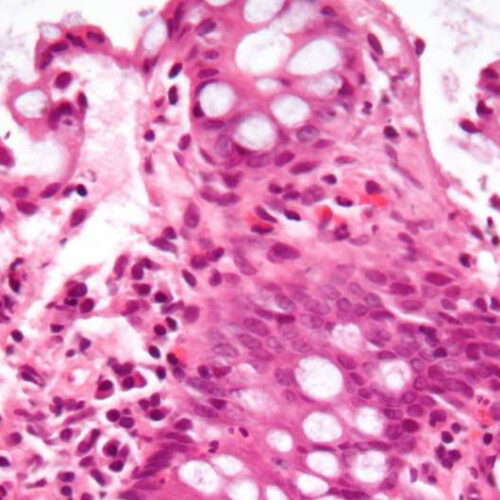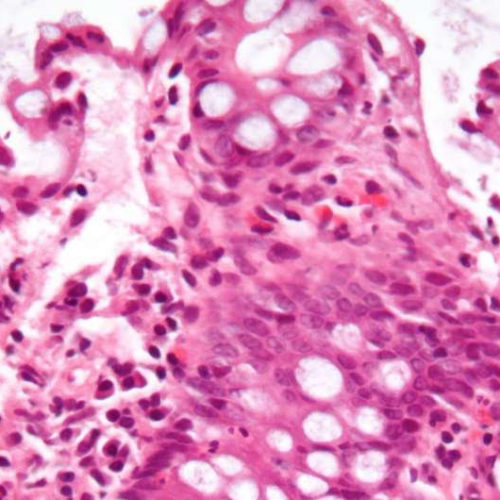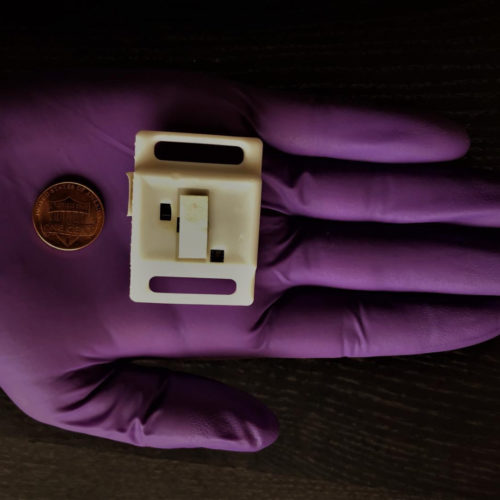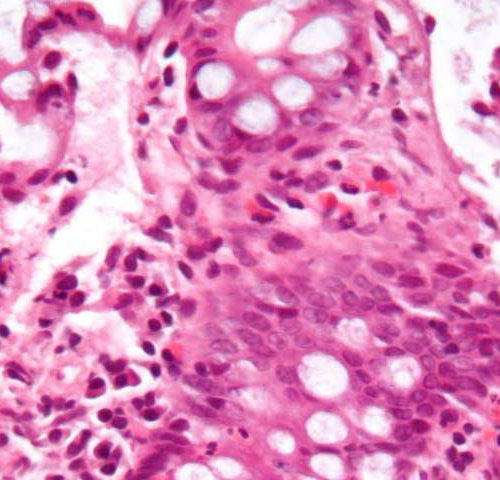by Brigham and Women’s Hospital Micrograph showing inflammation of the large bowel in a case of inflammatory bowel disease. Colonic biopsy. Credit: Wikipedia/CC BY-SA 3.0 The world of microbes living in the human gut can have far-reaching effects on human health. Multiple diseases, including inflammatory bowel disease (IBD), are tied to the balance of these microbes,...
Tag: <span>inflammatory bowel disease</span>
Scientists switch on tissue repair in inflammatory bowel disease
by KU Leuven Micrograph showing inflammation of the large bowel in a case of inflammatory bowel disease. Colonic biopsy. Credit: Wikipedia/CC BY-SA 3.0 A method that instructs immune system cells to help repair damaged tissues in the intestine has been developed by researchers at KU Leuven and Seoul National University. This opens the way for more effective treatment...
Turning microbiome research into a force for health
The microbiome comprises trillions of microorganisms living on and inside each of us. Historically, some researchers have guessed at its role in human health, but in the last decade or so genetic sequencing techniques have illuminated this galaxy of microorganisms enough to study it in detail. As researchers unravel the complex interplay between our bodies and microbiomes, they are...
Cure found for rare form of inflammatory bowel disease
by Mike Addelman, University of Manchester A rare genetic condition which causes inflammatory bowel disease can be successfully treated by bone marrow transplant, according to University of Manchester and Manchester University NHS Foundation Trust researchers. The disease, called G6PC3 deficiency, affects around one in a million people and causes inflammation of the bowel, as well as lung...
Multifunctional cell therapy system raises hopes to treat inflammatory bowel disease
Reviewed by Emily Henderson, B.Sc.,Sep 28 2020 The research by the UPV/EHU-University of the Basque Country, in collaboration with Harvard University, has yielded highly encouraging results, and studies in animal models have already begun. The UPV/EHU’s NanoBioCel research group has for many years been developing systems enabling cells to be used as drugs. Cell therapy raises hopes for treating...
Team develops wearable sensor to help people with inflammatory bowel disease
UNIVERSITY OF TEXAS AT DALLAS IMAGE: UT DALLAS RESEARCHERS DESIGNED A PROTOTYPE OF A WRISTWATCH-LIKE DEVICE THAT DETECTS TWO KEY BIOMARKERS ASSOCIATED WITH INFLAMMATORY BOWEL DISEASE. University of Texas at Dallas researchers have designed a wearable device that monitors sweat for biomarkers that could signal flare-ups of inflammatory bowel disease (IBD). A team of bioengineers demonstrated the...
Study reveals dietary fructose heightens inflammatory bowel disease
by Stony Brook University Micrograph showing inflammation of the large bowel in a case of inflammatory bowel disease. Colonic biopsy. Diet remains an important part of disease prevention and management, and a new study suggests that consumption of fructose may worsen intestinal inflammation common to inflammatory bowel diseases (IBD). Led by David Montrose, Ph.D., of the...
Immunosuppressive therapy for inflammatory bowel disease does not increase women’s risk of vulvar or vaginal cancer
by Elsevier In a new retrospective study, researchers found that the use of immunosuppressive therapy does not increase the occurrence or recurrence of vulvar or vaginal cancer in women with inflammatory bowel disease (IBD). However, earlier onset of cancer was reported, and lymphomas were found in some patients, which is very rare in the genital...
Guidance issued for food intake in inflammatory bowel disease
(HealthDay)—In an article from the International Organization for the Study of Inflammatory Bowel Disease, published online Feb. 14 in Clinical Gastroenterology and Hepatology, recommendations are presented regarding specific food consumption for patients with inflammatory bowel disease (IBD). Arie Levine, M.D., from the Wolfson Medical Center at Tel Aviv University in Israel, and colleagues reviewed the...
Specialized immune cells could help repair inflammatory bowel disease damage in children
UNIVERSITY OF BRITISH COLUMBIA A new study suggests that specialized immune cells that dampen inflammation and help repair the gut could be used as a potential therapy for children dealing with the painful symptoms of inflammatory bowel disease (IBD). The research from BC Children’s Hospital and the University of British Columbia shows that a specific...





